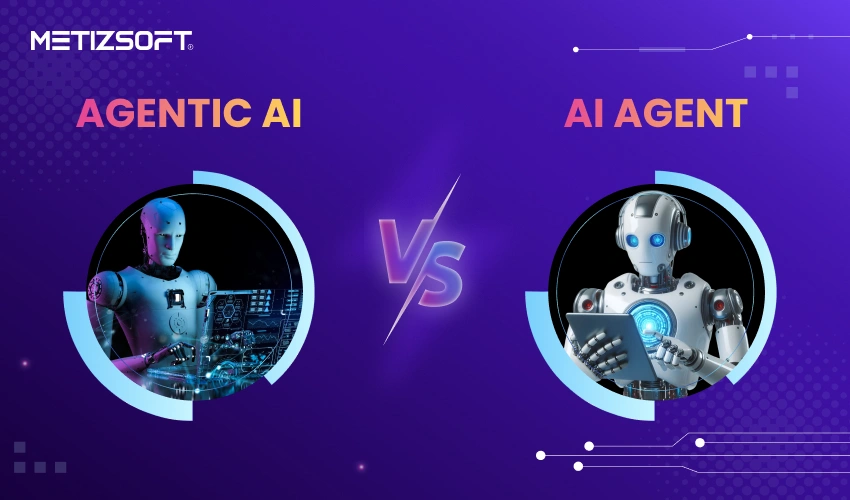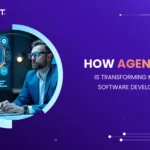
Table of Contents
Introduction
The emergence of AI in various technologies has made it challenging for businesses to choose which type is more suitable for their ecosystem. Especially similar-sounding concepts like Agentic AI and AI Agents! They might sound similar, but there’s a big difference. Hence, understanding the difference between Agentic AI vs AI Agents is critical. It is more about a strategic move for your business rather than just about technicalities.
Let’s gain insights into the crucial differences between Agentic AI and AI Agents, and understand how these two AI terms operate at entirely different levels, each with unique strengths, weaknesses, and real-world impacts.
What is Agentic AI?
Agentic AI is next-gen artificial intelligence that can work independently. Unlike traditional AI, which needs constant instructions for every task, Agentic AI sets its own goals, makes smart decisions based on the situation, and takes appropriate action without you always telling it what to do.
Instead of just following a script, Agentic AI can understand tricky situations, plan out multiple steps to reach a goal, learn from new information, and even fix its own mistakes.
Examples of Agentic AI in Use
- Self-driving Car: Agentic AI chooses the best route based on real-time traffic. It decides where to go based on your calendar, habits, or goals without needing you to tell it each step.
- Smart Sales Campaigns: Agentic AI can create a full strategy, write personalized emails, and even adjust its approach based on how many people open or click your messages.
- Product Development Support: Devin, the “AI software engineer,” helps product managers analyze what customers want, prioritize tasks, write actual code, and test the results.
What is an AI Agent?
An AI agent is a smart artificial intelligence assistant designed to do specific jobs or solve problems. It acts on human instructions and sticks to them to achieve goals. An Artificial Intelligence agent quickly senses its surroundings, understands the information, and then takes action to complete its assigned task. It works within the boundaries you set.
For example, if you tell it to organize your emails, it will do just that. It’s really good at following your commands and getting things done efficiently and reliably.
Examples of AI Agents in Use
If you are an avid AI user in your personal or professional life, then you have probably interacted with AI agents more than you realize. For example:
- Customer Support Bots: These are the helpful AI agents that pop up on websites to answer simple questions like, “Where’s my order?” or “What are your store hours?” It has made customer interaction quick and basic assistance.
- Recommendation Engines: Ever wonder how Netflix knows exactly what movie you might like, or Amazon suggests products you’ll love? That’s an AI agent at work! These recommendation engines analyze your past behavior to suggest content or products you might be interested in.
- Process Automation Bots (RPA): RPA bots are AI agents that automate repetitive tasks in the business world. They can do things like automatically filling out forms or transferring data between different computer systems, saving people a lot of time and effort.
Key Differences Between Agentic AI vs AI Agent
Autonomy Level: Agentic AI is designed to operate with a high degree of autonomy. It can set its own smaller goals, make smart strategic choices, and even handle surprising situations without constantly needing human approval.
AI agents have less independence compared to agentic AI. Their actions are limited to following predefined rules, workflows, or triggers set by people. They need clear instructions from you.
Purpose: Agentic AI aims for greater autonomy and adaptability. It handles complex situations and even unexpected challenges without constant human input.
On the other hand, AI agents are created for more specific, well-defined tasks. They’re excellent at performing their job within a set framework, often needing clear instructions and human oversight.
Decision Making: Agentic AI can look at a situation, decide what’s most important, change its plans if needed, and even sort out conflicting goals without constant human help.
On the other hand, AI agents strictly base their decisions on the rules and instructions they’ve been given. Their job is to perform specific tasks and make choices only when triggered by their programming.
Learning Capabilities: Agentic AI systems are built to learn continuously. They constantly take in information from their surroundings, get feedback, and see how well they perform. This helps them improve their strategies and even adjust their goals as they gather more data.
On the other hand, AI agents learn in a more structured way. They rely on a stable training model or monitor learning. This means that they improve when human developers give them new sets of data or adjust the rules.
Integration with other technologies: Agent AI connects and uses different techniques (Cloud systems, IoT networks, or data analysis tools) in real time to achieve its goals. It must dynamically use its approach as needed to work, no matter what equipment is required.
On the other hand, AI agents integrate with other technologies, but only within specific boundaries that humans have set. They utilize a predefined set of tools and connections, adhering to their programmed rules.
Human Input Dependency: Agentic AI can handle tasks and adapt to changes with much less human oversight. This AI supervises itself and stays on course, reducing the need for constant human checking.
On the other hand, AI agents need people to step in, make adjustments, and ensure they stay relevant and on track. So, while they’re powerful tools, they’re not quite as hands-off as agentic AI.
Scope of Action: AI agents work within very specific, fixed boundaries. This specialized tool is great at one job but doesn’t easily adapt to others. They have a clear set of tasks and operate within those limits.
On the other hand, agentic AI is much more adaptable and can take a wider range of actions. It’s quickly learn and adjust, even when facing new or unexpected situations.
Responsiveness to Change: Agentic AI excels in situations where things are constantly changing and unpredictable. But, it has a quick adaptability quality in real-time and figures things out even when it encounters new challenges.
On the other hand, AI agents are best for stable and structured environments. They follow a set of rules and are great at performing specific tasks efficiently within a predictable system.
Agentic AI vs AI Agent: Why the Difference Matters?
The difference between AI agents and Agentic AI is more about what kind of impact you want to make using them. Here’s why the choice matters:
- Boost Your Business Agility: AI agents make your daily operations smoother and more efficient. They’re like reliable workers for specific tasks. But if you need systems that can adapt to change, solve tricky, open-ended problems, and even innovate on their own, then Agentic AI is what you need.
- Smart Cost Efficiency: While AI agents definitely save you time and reduce the need for manual work, they often require more human oversight. Agentic AI, on the other hand, might cost more to set up initially. But it also offers a much bigger long-term return on investment (ROI). That’s because it can operate with less supervision and handle much more complex tasks as it grows.
- Powerful Strategic Applications: If you’re looking for AI that can tackle unpredictable situations, learn from its own results, and constantly improve over time, Agentic AI is the way to go. This makes it incredibly powerful for things like product development, running dynamic sales outreach campaigns, or even conducting complex research.
If you’re looking to leverage these advanced AI capabilities, hire AI developers to guide your strategy and implementation.
Agentic AI vs AI Agent: Market Trends, Adoption, and Growth
While both AI agents and Agentic AI are becoming popular, Agentic AI is truly set to change how businesses use intelligence. It’s defining the next big step in enterprise AI.
Here’s a quick look at what the numbers tell us:
- A significant 51% of companies are already using basic AI agents for everyday tasks like customer support, scheduling appointments, and analyzing data. They’re making daily operations smoother.
- Roughly 29% of businesses are currently trying out Agentic AI workflows. Even more exciting, a massive 44% plan to implement Agentic AI systems within the next year!
- The market for Agentic AI is expected to jump from $7.6 billion in 2025 to a huge $47 billion by 2030.
These numbers clearly show how businesses are no longer just looking for AI to automate simple tasks. They want strategic, intelligent partners that can adapt, learn, and grow with them. By partnering with an AI development company, you can build custom AI agents and Agentic AI with all these capabilities!
Agentic AI vs AI Agent: Which One to Choose and When?
The right choice between Agentic AI and AI Agents doesn’t depend on how advanced your system is. It depends on how you scale your product using these game-changing technologies.
Here’s how you can decide which one to choose and when:
When to Choose Agentic AI
Agentic AI is a powerful tool for more complex and development needs.
- When the goals can change: If the goals of your project can move forward, the agentic AI is perfect. It does not just follow the instructions; It decides what to do, not how to do it.
- Working across different tools and teams: If your tasks involve multiple software tools, departments, or platforms, Agentic AI can seamlessly manage these complex, multi-step processes. It’s much more flexible than rigid, rule-based systems.
- When context makes a difference: If your system needs to learn and get better over time by understanding user behavior or past results, Agentic AI excels. The more it learns, the smarter its future actions become.
- Building for long-term strategy: Ultimately, agentic AI helps you build long-term partnerships that grow and evolve with your products and users. They facilitate strategic automation that delivers lasting value.
When to Choose AI Agents
AI agents are perfect for specific situations where you need reliable automation.
- Tasks that don’t change: If your task is always the same, and you know exactly what information goes in and what result you expect, AI agents are ideal. They handle stable processes with predictable outcomes.
- Speed is key: AI agents deliver quick responses and fast task completion. They enhance efficiency without any complex strategic thinking.
- You need tight control: For systems where rules operate strictly (regulated industries, compliance), AI agents are the best choice. They operate within the set boundaries, ensuring consistent and predictable actions.
- Starting with automation: AI agents should be the first step for someone with no AI background who wants to try automation. They are easier than others to create and will never mess up your current systems.
Get Started with Metizsoft AI Agents
The digital landscape is evolving with every AI update and innovation. So, using AI isn’t enough to get ahead anymore. To truly succeed, you need to pick the right kind of AI for your specific business needs. As a top AI/ML development company, we help businesses like yours put AI agents that are smart, flexible, and truly useful for your daily operations.
Whether you’re looking to automate a simple task or manage complex processes across different departments, we design/develop AI agents that fit perfectly into your existing setup and can gradually evolve with your company.
Our AI experts start by understanding your goals, how your systems work, and who will use the AI. From there, we build custom AI agents that can handle those repetitive tasks instantly, helping your business run more smoothly and efficiently. Contact us today for a one-on-one discussion!
AboutManthan Bhavsar
Related Posts
Finally, Shopify Site Owners Can Edit Their Robots.txt Files
The Recent Update – News broke quietly from the Shopify admin, where the leading e-commerce platform announced this week...
What’s New in WordPress 6.8 (2025 Edition): Key Features and Enhancements
Table of Contents SummaryIntroductionMajor Improvements in WordPress 6.8Key Considerations Before Updating to WordPress...

